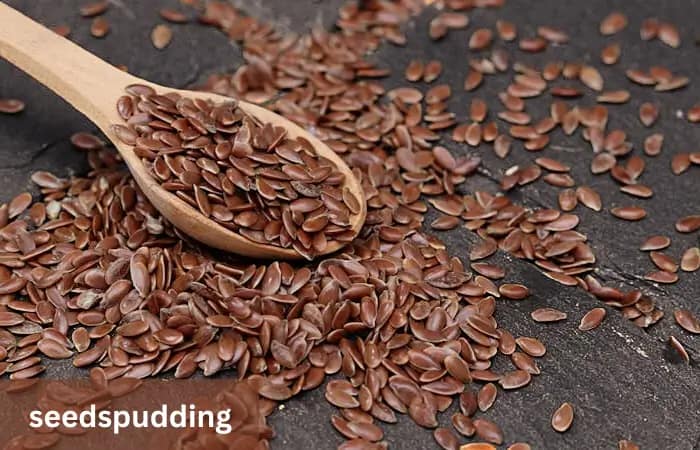Flax seeds is one of the oldest seeds , people grew them as a crop that has been cultivated in ancient China and Egypt.
Today Flax seeds are available in various forms of oils, seeds, tablets and flour.
As time progressed, flax seeds found their way to Europe during medieval times and became a staple crop, influencing diets and textiles alike. European settlers later brought flax to North America, where it played a crucial role in colonial agriculture. Today, flax seeds continue to captivate modern consumers, celebrated for their nutritional prowess and historical significance, making them a tiny yet timeless superfood.

Table of Contents
ToggleFlax Seeds Health Benefits
Packed with essential nutrients, these small seeds have been a staple in human diets for centuries. In this article we will cover flax seeds and their health benefits.
- Full of nutrients
- Heart Health
- Digestive Health
- Best For Weight Loss
- Anti-Inflammatory Properties
- Rich in Antioxidants
- May reduce blood pressure
1. Nutritional Facts
Flax seeds are an excellent source of essential nutrients that contribute to overall well-being. They are rich in omega-3 fatty acids, fiber, lignans, and various vitamins and minerals. The combination of these nutrients makes flax seeds a nutritional powerhouse with the potential to positively impact various aspects of health.
One cup (168 g) of flaxseeds contain (3):
- Calories : 897
- Protein : 30.7g
- Fat : 71g
- Carbs : 48g
- Iron : 9.63 mg
- Calcium : 428 mg
- Copper : 2.05 mg
- Vitamin B6 : 0.795 mg
2. Heart Health
One of the standout features of flax seeds is their ability to promote heart health. The omega-3 fatty acids present in flax seeds, specifically alpha-linolenic acid (ALA), play a crucial role in reducing inflammation and lowering the risk of cardiovascular diseases. Regular consumption of flax seeds has been linked to lower blood pressure and improved cholesterol levels.
3. Digestive Health
Flax seeds are an excellent source of dietary fiber, both soluble and insoluble. This fiber content aids in promoting a healthy digestive system by preventing constipation and promoting regular bowel movements. The mucilage content in flax seeds adds a soothing effect on the digestive tract, making them a valuable addition to a balanced diet.
4. Best For Weight loss
For those looking to manage their weight effectively, incorporating flax seeds into their diet can be a game-changer. The combination of fiber and healthy fats in flax seeds helps promote a feeling of fullness, reducing overall calorie intake. Additionally, the omega-3 fatty acids contribute to a faster metabolism, assisting in weight management efforts.

5 : Anti-Inflammatory Properties
Inflammation is at the root of many chronic diseases, and flax seeds possess potent anti-inflammatory properties. The lignans in flax seeds have been shown to reduce inflammation and may play a role in preventing certain chronic conditions, such as arthritis and inflammatory bowel diseases.
6: Rich in Antioxidants
Flax seeds are abundant in antioxidants, which help combat oxidative stress and protect the body from free radicals. Antioxidants play a crucial role in preventing cell damage and reducing the risk of chronic diseases, including certain types of cancer.
7: May reduce blood pressure
Flax seeds have garnered attention for their potential role in reducing blood pressure (4) and promoting cardiovascular health . The omega-3 fatty acids, particularly alpha-linolenic acid (ALA), found in flax seeds have been associated with blood pressure regulation.
ALA contributes to the production of anti-inflammatory compounds and helps dilate blood vessels, leading to improved blood flow and lower blood pressure. Additionally, the high fiber content in flax seeds may contribute to their blood pressure-lowering effects by promoting overall heart health.
Incorporating flax seeds into a balanced diet may offer a natural and heart-healthy way to manage blood pressure levels, providing a simple yet effective addition to cardiovascular wellness strategies. However, individuals with existing health conditions or concerns should seek advice from healthcare professionals for personalized recommendations.
How to Incorporate Flax Seeds into Your Diet:
Adding flax seeds to your daily diet is easy and versatile. Sprinkle ground flax seeds on yogurt, cereal, or salads. Incorporate them into smoothies, baked goods, or use flaxseed oil as a dressing. The options are limitless, allowing you to enjoy the health benefits of flax seeds in a variety of delicious ways.
Another super seed that you should incorporate in your diet is chia seeds. To learn more on how to use chia seed. Check this out : how to use chia seeds
The Bottom line
Flax seeds, often underestimated due to their small size, have proven to be a nutritional powerhouse with a myriad of health benefits. From promoting heart health to aiding in weight management and providing anti-inflammatory properties, flax seeds deserve a place in everyone’s diet.
So, Embrace the versatility of flax seeds and embark on a journey towards better health and well-being.
FAQ's on Flax Seeds
Q: Are there any potential allergic reactions to flax seeds?
A: While allergies to flax seeds are rare, individuals with a history of seed allergies should exercise caution. It’s advisable to start with small amounts to observe any adverse reactions.
Q: Can flax seeds be consumed during pregnancy?
A: Flax seeds are generally safe for consumption during pregnancy and can provide essential nutrients. However, pregnant individuals should consult with their healthcare providers for personalized advice based on their specific health conditions.
Q: Do flax seeds have any potential side effects?
A: In some cases, consuming large quantities of flax seeds without sufficient water may cause digestive issues. It’s essential to stay hydrated when incorporating flax seeds into the diet. Individuals on medication or with certain health conditions should consult healthcare professionals before making significant dietary changes.
Q: Are there variations in nutritional content between brown and golden flax seeds?
A: Both brown and golden flax seeds offer similar nutritional profiles, including omega-3 fatty acids, fiber, and lignans. The primary difference lies in the color, with some minor variations in taste. Ultimately, the choice between brown and golden flax seeds is a matter of personal preference, as both varieties provide comparable health benefits.




